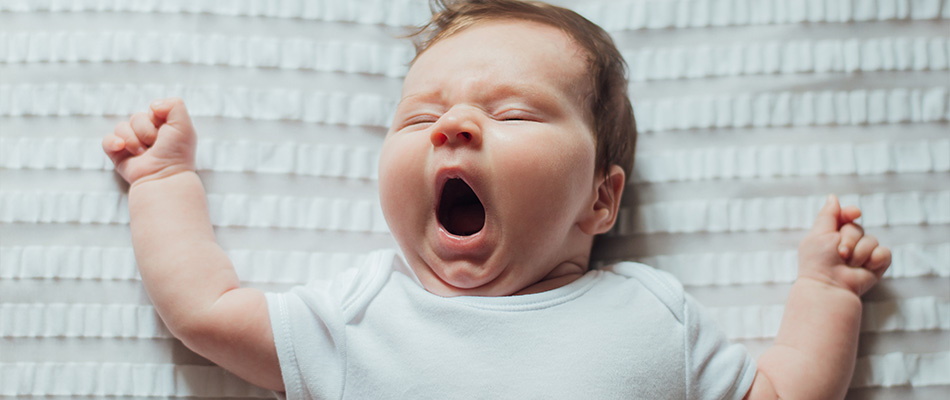This is how much sleep babies need in the first few months
Are you wondering how much sleep babies really need in the first few months of life? Then the following information can offer you an idea. However, since these are only averages, it’s possible for this to vary, so there’s no need to worry if your baby sleeps one to two hours less a day or needs more sleep.
- Newborns sleep an average of 16 to 18 hours. You have no fixed bedtime, but are "overwhelmed" by sleep during the day and at night.
- Babies up to 16 weeks old sleep an average of 14 to 15 hours a day. You can already observe an extended nights sleep with them.
- From the age of six months, toddlers sleep a maximum of 14 hours a day. Since they only need 2-3 short naps a day, the main sleep phase takes place at night. Then at the latest it makes sense to introduce fixed routines and bedtime.
- Between eight to ten months, the sleep behaviour changes again significantly. Babies only need one or two short naps during the day. In the evening, it helps them to fall asleep early, as they sometimes sleep worse at night due to development spurts.
In the first three months of life, babies sleep throughout the day
In the first few months of life, your little one will sleep a lot. In contrast to an adult, the waking and sleeping phases are distributed relatively evenly over night and day. Most of the time, your baby will sleep for around three to four hours, only to be awake every now and then. Since the 16 to 18 hours of sleep are evenly distributed, babies wake up more often during the night. For them this is a kind of "natural protective mechanism". Since your baby is only slumbering in a light REM sleep, they can theoretically wake up at any time to tell you their needs. So be prepared for your little darling to wake up several times during the night. Either because they’re hungry or, feel uncomfortable in a full nappy.
For you, this may result in very stressful sleep deprivation if you get up for your little one several times a night. In the course of time, however, their sleep phases shift more and more into the night hours. As early as eight weeks, your sweetheart will take short naps for a maximum of three hours during the day and sleep more hours at night. In addition, after a few months, your baby learns to (re) fall asleep independently, even without direct physical contact with the parents. When baby wakes up at night, they still need your presence and attention to feel safe and secure.
How your baby's sleep behaviour develops up to the age of six months
As early as the fourth month of life, your baby will mostly sleep at night. Instead of mild REM phases, most babies go into deep sleep phases, which means that they are sleeping a little more soundly than before. Nevertheless, your child will still want to make sure at night that “everything is okay” or suddenly get hungry. Over time, your baby will eventually develop something like a "regular" sleep pattern. Since baby can orient itself more and more to the different times of the day and night, it falls asleep at around the same time in the evening and wakes up again at around the same time in the morning. Around the sixth month of life, some infants manage to “sleep through the night” for up to six hours at a time.
At around one year old, some babies sleep up to eight hours
Between the 9th and 12th month of life, your little one only takes a little nap about twice a day. There are also babies who are satisfied with a nap at noon at this point and apart from that only sleep at night.
At times, regression is quite normal
As with speaking or running, toddlers don’t learn to fall asleep and stay asleep overnight. If you slumber through a night, it does not necessarily have to be the case the next day. Rather, regression is quite normal, as the sleep rhythm of toddlers is not yet stable. Their “tolerance limit” is much lower, so that they fall back into old patterns, for example, when they are sick or experience stress. It is advisable not to let this unsettle you and to stick to your usual rituals. Just lovingly give your child a lot of security and care that they need to fall asleep. While doing this, stay calm with your family and don't look so much at what others are doing. After all, every child sleeps differently, and that's a good thing.






